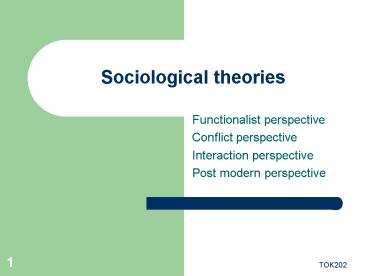Sociological theories PowerPoint PPT Presentation
1 / 22
Title: Sociological theories
1
Sociological theories
- Functionalist perspective
- Conflict perspective
- Interaction perspective
- Post modern perspective
2
Founders of the functionalist perspective
- August Comte (1798-1857)
- Herbert Spencer (1820-1903)
- Émile Durkheim (1858-1917)
3
August Comte (1798-1857) "father of sociology"
- The science about society
- social physics
- Comte invented the term sociology
- Evolutionist
- Positivist
4
Comtes positivism
- Comte's views of the three stages of the history
of sciences. In order as follows, the stages
are - Theological - nature has a will of it's own. This
stage is broken down into three stages of its
own, including animism, polytheism, and
monotheism. - Metaphysical state - though substituting ideas
for a personal will. - Positive - a search for absolute knowledge.
5
Herbert Spencer (1820-1903)
- Englishman
- Evolutionist survival of the fittest
- Optimist
- Laissez-faire liberalism
6
Émile Durkheim (1858-1917)
- Frenchman
- Evolutionist
- Division of labour
- Study of suicide
- Anomy
- Statistics applied in sociology
7
Functionalism
- Society is a combination of different
parts/institutions such as - Family, religion, economy and educational system
- These institutions secure the evolution and
growth of society
8
The characteristics of society
- Well planned uniformity
- Stability and equilibrium between different
parts - Consensus of the main values
- Every institution has a function which helps
society to remain stable - What is, is good natural selection of good
institutions/functions
9
Functionalistic research questions?
- Mapping, describing and analysing
- The positive functions
- The institutions
- (The dysfunctions)
10
Assignment
- Mention all main parts/institutions which you
believe are the brick stones of society. How do
these parts work together in creating societies
equilibrium? - What are the main weaknesses of the functionalist
perspective in describing society? - Is it politically biased? If, then how?
11
Conflict perspective
- Founders?
- Karl Marx (1818-1883)
- German revolutionist philosopher, sociologist and
economist - Friedrich Engels (1820-1895)
- German socialist philosopher
12
Marxism
- Historical materialism
- It is not the consciousness of men that
determines their existence, but on the contrary,
it is their social existence which determines
their consciousness... - Dialectic
- Class struggle
- National economy
- Socialism
- Communism
13
Conflict perspective in modern sociology
- Not only focusing on class struggle as Marx did,
but on the overall power structure in society,
such as conflicts between different groups of
interests - Producers and consumers, employers and employed,
Muslims and Christians, teachers and students,
parents and kids, personality and culture
14
Conflict causes social change
- In every society there are conflicts conflict is
the driving force of social change - Conflict does not necessary mean violence, rather
tension, competition or disagreement about
objectives and values, conflict of interests
15
Research questions?
- Mapping of power-relations
- Someone is making benefit of the situation at the
expense of someone else - How can we dissolve the conflict? Can there be a
win-win solution?
16
Conflict vs. functionalist perspective
- The conflict paradigm highlights parts of society
where functionalists usually do not focus on - The weakness of the conflict paradigm is that
they miss the consensus- and balance in society
17
Assignment
- The conflict paradigm presupposes that resources
and power are limited, which in turn, creates
tension and conflicts between different groups. - Investigate some relationships within the school
from the viewpoint of conflict theories, for
example the relationship between teachers and
students, or between school-board and students,
or between pastime and studies.
18
Assignment
- The functionalist paradigm presupposes that every
part of society has a (positive) function. - Investigate some relationships within the school
from the viewpoint of functionalist perspective,
for example the relationship between teachers and
students, or between school-board and students,
or between pastime and studies.
19
Interaction perspective
- Max Weber (1860-1920)
- Verstehen
- Understanding the meaning of human action
- Thought to be characteristic of the social
sciences opposed to the natural sciences - Identifies different kinds of authorities
- Traditional
- Charismatic
- Rational
- Ideal types
- Institutionalised social action
- Iron cage
20
Interaction perspective/founders
- George Herbert Mead (1880-1949)
- Symbolic interaction
- Human behaviour has a deeper symbolic meaning
- Humans learn the meaning of social behaviour, by
socialisation - Erving Goffman (1922- )
- Role theory
21
Objectivity/impartiality
- Is objectivity possible in (social) sciences?
- Scientists have consciousness formed by their
personal experience, they live in a certain
culture, place and time, they have their personal
interests - Is objectivity desirable in science?
22
Postmodernism/post structuralism
- Michel Foucault (1926-1984)
- History of madness and medicine
- History of sexuality
- The Archaeology of Knowledge
- Deconstruction
- Discourse/discourse analysis
- Plurality of knowledge and method
- Power and knowledge Relativism

